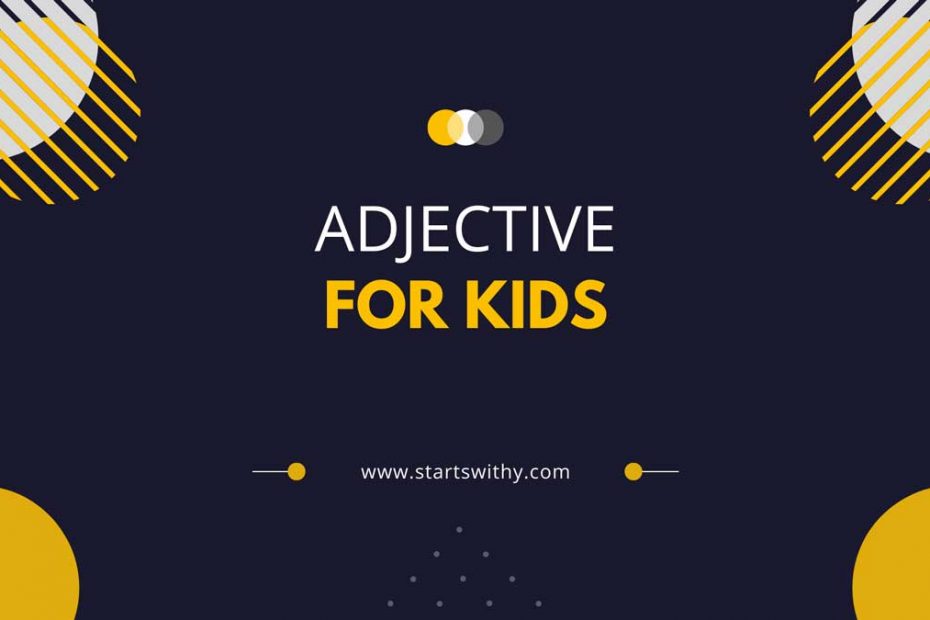No matter what age we are, adjectives are a part of our everyday lives. We use them to describe people, places, and things. Adjectives make our language犀利士 more interesting and can even make a person sound more intelligent.
But what are adjectives? Adjectives are words that describe, identify, and quantify people or things and usually come before a noun or pronoun in a sentence. For example, in the sentence “The blue car is mine,” the word “blue” is an adjective that describes the car.
Adjectives can be used to describe the physical appearance of someone or something, but they can also describe non-physical qualities such as emotions, feelings, personalities, and conditions.
Let’s take a look at some of the most common adjectives for kids.
Adjectives For Kids
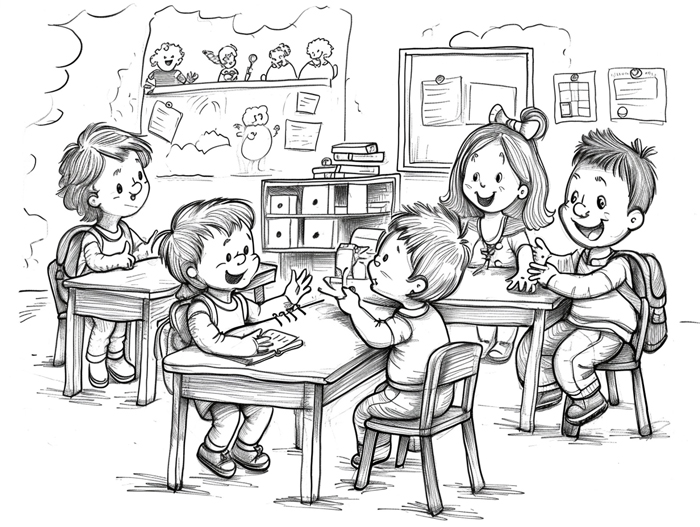
Adjectives are a great way to add interest to your child’s writing. They can help describe people, places, things, and ideas. Here are some tips to help your child use adjectives in their writing:
- Encourage your child to brainstorm a list of adjectives before they start writing. This will help them to be more aware of the words they can use to describe what they are writing about.
- Remind your child to use adjectives throughout their writing, not just at the beginning or end.
- Help your child to choose interesting and specific adjectives. This will make their writing more engaging for readers.
- Encourage your child to use adjectives in creative ways. For example, they could use them to create similes or metaphors.
- Finally, encourage your child to have fun with their writing. Adjectives are a great way to add personality and flair to their writing.
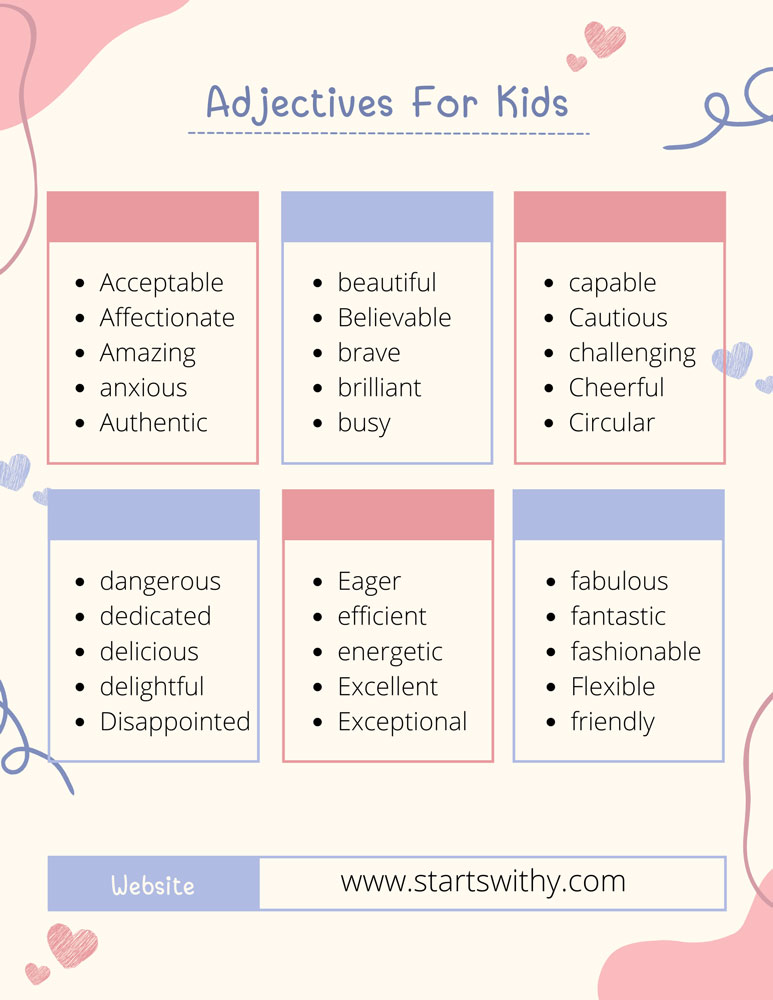
A
| Absurd | Acceptable | Accepting |
| Adaptable | Adorable | Adventurous |
| Affectionate | Agreeable | Alert |
| Amazing | Ambitious | Amicable |
| Amusing | Ancient | Angry |
| Animated | Annoyed | Anxious |
| Apologetic | Approachable | Articulate |
| Artistic | Assertive | Attentive |
| Authentic | Average | Aware |
| Awesome |
B
| Bashful | Beaming | Beautiful |
| Believable | Big | Bitter |
| Bold | Brave | Brave |
| Breezy | Bright | Brilliant |
| Broad | Buff | Bulky |
| Bumpy | Busy |
C
| Calm | Capable | Captivating |
| Cautious | Challenging | Charismatic |
| Charming | Chatty | Cheerful |
| Chilly | Circular | Clear |
| Clever | Cloudy | Coarse |
| Colorful | Communicative | Compassionate |
| Confident | Considerate | Consistent |
| Contemplative | Content | Cool |
| Cooperative | Cordial | Courageous |
| Courteous | Cozy | Cranky |
| Creative | Creepy | Crispy |
| Cruel | Curly | Curvy |
| Cute |
D
| Damp | Dangerous | Daring |
| Dark | Dazzling | Dedicated |
| Deep | Delicate | Delicious |
| Delightful | Detail Oriented | Determined |
| Devoted | Diligent | Disappointed |
| Disrespectful | Double | Dreadful |
| Dry | Dull | Dynamic |
E
| Each | Eager | Easy-Going |
| Ecstatic | Effervescent | Efficient |
| Enchanting | Endearing | Endless |
| Energetic | Enormous | Enterprising |
| Entertaining | Every | Excellent |
| Exceptional | Exhausted | Expressive |
| Extraordinary | Exuberant |
F
| Fabulous | Fair | Faithful |
| Fantastic | Fascinating | Fashionable |
| Fat | Fearless | Few |
| Fierce | Fiery | First |
| Fit | Flat | Fleecy |
| Flexible | Fluffy | Focused |
| Foggy | Foolish | Forgiving |
| Freezing | Friendly | Frightened |
| Frustrated | Funny | Furious |
| Furry | Fussy | Fuzzy |
G
| Generous | Gentle | Gifted |
| Gigantic | Glistening | Glowing |
| Gorgeous | Graceful | Gracious |
| Gutsy |
H
| Hairy | Hard-Working | Helpful |
| Hilarious | Hollow | Honest |
| Hopeful | Huge | Humid |
I
| Imaginative | Impossible | Impressive |
| Independent | Industrious | Inquisitive |
| Insightful | Inspiring | Intelligent |
| Intense | Interesting | Inventive |
| Involved |
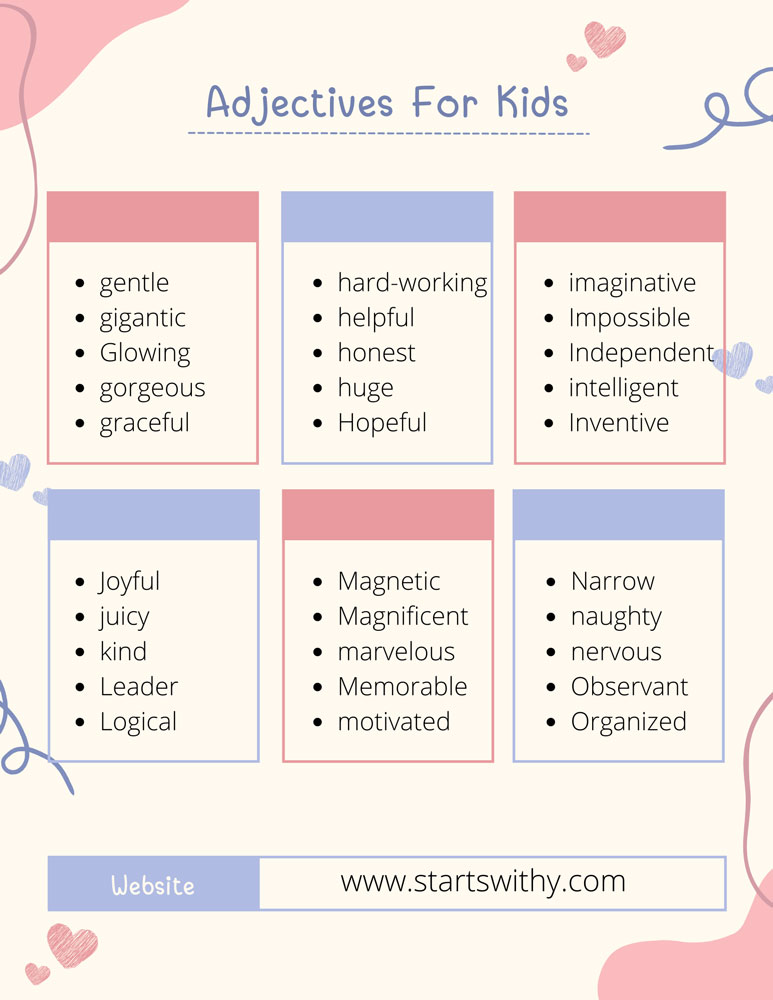
J | K | L
| Jolly | Joyful | Juicy |
| Kind | Knowledgeable | Lazy |
| Leader | Likable | Logical |
| Long | Lousy | Loved |
| Loving | Loyal | Lumpy |
M
| Magnetic | Magnificent | Many |
| Marvelous | Mean | Memorable |
| Messy | Methodical | Meticulous |
| Mindful | Modest | Motivated |
| Mushy |
N
| Naive | Narrow | Naughty |
| Nervous | New | Nice |
| Nimble | Nurturing |
O
| Observant | Okay | One |
| Open-Minded | Opinionated | Optimistic |
| Organized | Original | Outspoken |
| Outstanding |
P
| Passionate | Patient | Persistent |
| Petite | Phenomenal | Philosophical |
| Playful | Pleasant | Plump |
| Polite | Positive | Practical |
| Precise | Pretty | Prickly |
| Proud |
Q | R
| Quick | Radiant | Rainy |
| Rare | Realistic | Reflective |
| Reliable | Reserved | Resilient |
| Resourceful | Respectful | Responsible |
| Rough |
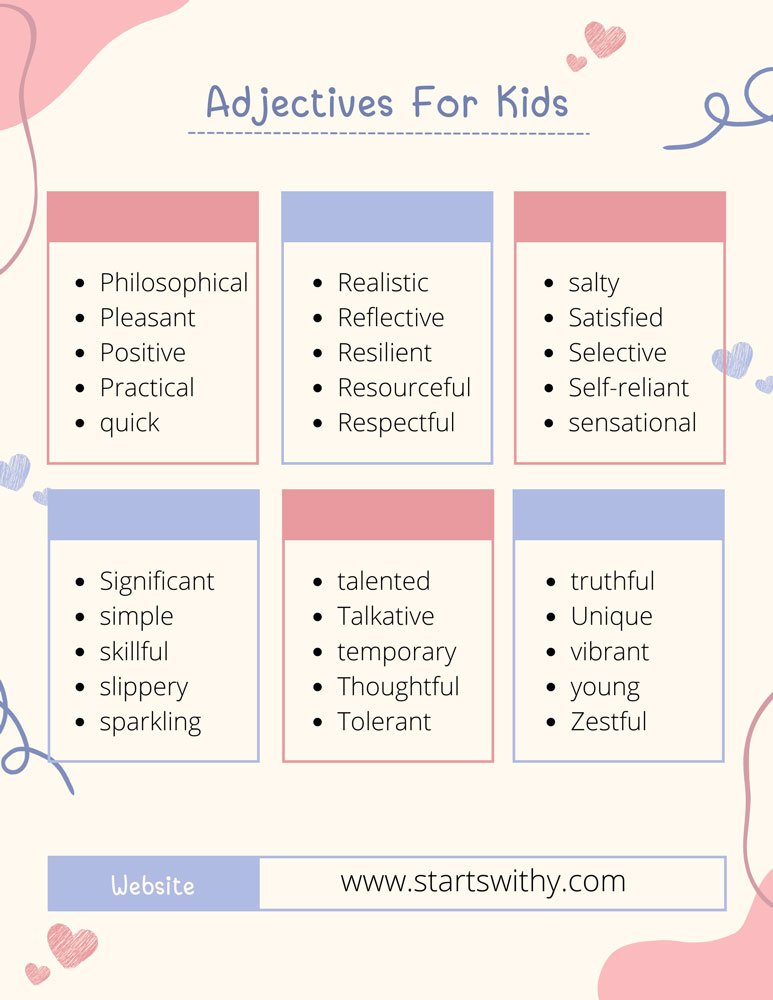
S
| Salty | Satisfied | Scratchy |
| Second | Selective | Self-Confident |
| Self-Reliant | Self-Starting | Sensational |
| Sensitive | Shocking | Short |
| Significant | Simple | Sizes |
| Skilled | Skillful | Skinny |
| Slick | Slim | Slimy |
| Slippery | Sloppy | Slow |
| Small | Smooth | Social |
| Soft | Sour | Sparkling |
| Spiky | Spirited | Spoiled |
| Spontaneous | Spunky | Square |
| Steadfast | Sticky | Stiff |
| Still | Stinky | Straight |
| Strong | Structured | Stubborn |
| Stunning | Successful | Sunny |
| Superb | Supportive | Swollen |
T
| Talented | Talkative | Tall |
| Temporary | Tenacious | Terrific |
| Terrified | Thin | Third |
| Thoughtful | Timid | Tiny |
| Tolerant | Tough | Triangular |
| Tricky | Trustworthy | Truthful |
U | V | W | Y | Z
| Unconventional | Understanding | Unique |
| Upset | Versatile | Vibrant |
| Weak | Well | Wet |
| Willing To Try | Windy | Wise |
| Witty | Wonderful | Young |
| Zestful |
Hey there, young wordsmiths! Are you ready to dive into the world of adjectives? Well, buckle up because I’m about to take you on an exciting journey where words come to life and sentences become vibrant and descriptive. Adjectives are like the superheroes of the English language, adding color, flavor, and personality to our everyday conversations. Whether it’s describing a delicious ice cream cone, a beautiful sunset, or a friendly puppy, adjectives help us paint a vivid picture in our minds and bring our stories to life. So, get ready to unleash your creativity as we explore the wonderful world of adjectives together!
How to Describe Kids? – Different Scenarios
When it comes to describing kids, the English language offers a plethora of adjectives that can help paint a vivid picture of their unique characteristics and personalities. Whether you are a kindergarten or a preschool teacher, finding the right words to describe kids can greatly enhance their learning experience. Let’s explore different scenarios and the adjectives that can be used to describe kids in each situation.
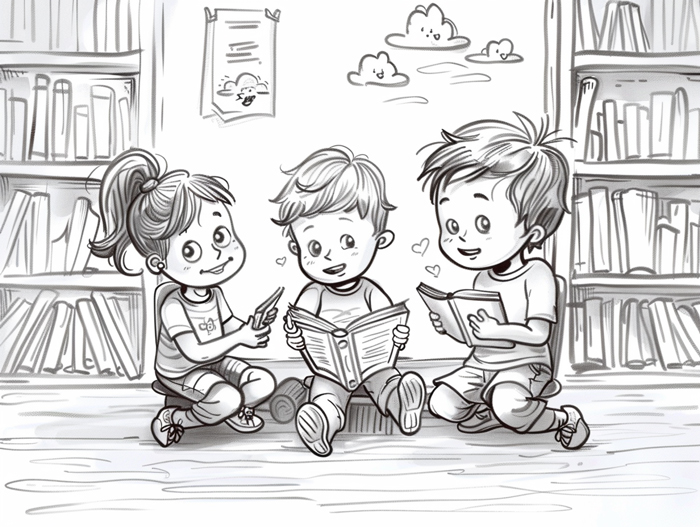
1. In the Classroom
In the classroom, it’s crucial to use adjectives that highlight a child’s behavior, abilities, and engagement. Here are some examples:
- Active: This adjective describes children who are energetic, always on the move, and enthusiastic about participating in activities.
- Curious: Use this word to describe kids who show a strong desire to learn, ask a lot of questions, and are eager to explore new ideas.
- Attentive: When a child is attentive, they are focused, paying close attention, and actively listening to instructions or discussions.
- Creative: This adjective is perfect for describing kids who demonstrate original thinking, imagination, and a flair for artistic expression.
2. During Playtime
When kids are engaged in play, different adjectives can capture their behavior and interactions. Here are a few examples:
- Playful: Use this adjective to describe children who are full of joy, laughter, and love for imaginative play.
- Adventurous: This word perfectly describes kids who are daring, willing to take risks, and eager to explore new experiences.
- Inquisitive: Use this adjective to describe children who are curious about the world around them, always searching for answers, and eager to discover new things.
- Cooperative: When kids work together harmoniously and collaborate effectively, they can be described as cooperative.
- Friendly: This adjective describes kids who are warm, approachable, and open to making new friends.
- Kind: Use this word to describe children who consistently show empathy, compassion, and consideration towards others.
- Confident: When kids have a strong sense of self-assurance, believe in their abilities, and express themselves boldly, they can be described as confident.
- Helpful: This adjective is perfect for children who willingly assist others, offer support, and show a willingness to
Read: Describing Words for Dreams: Examples of Adjectives
Describing Words for Kids in English
As a seasoned teacher, I know how important it is to have a variety of adjectives to accurately describe the amazing kids in our classroom. Using descriptive words not only helps children to develop their language skills, but it also encourages them to understand and express their unique qualities. Let me share a list of some describing words for kids in English that can bring their vibrant personalities to life:
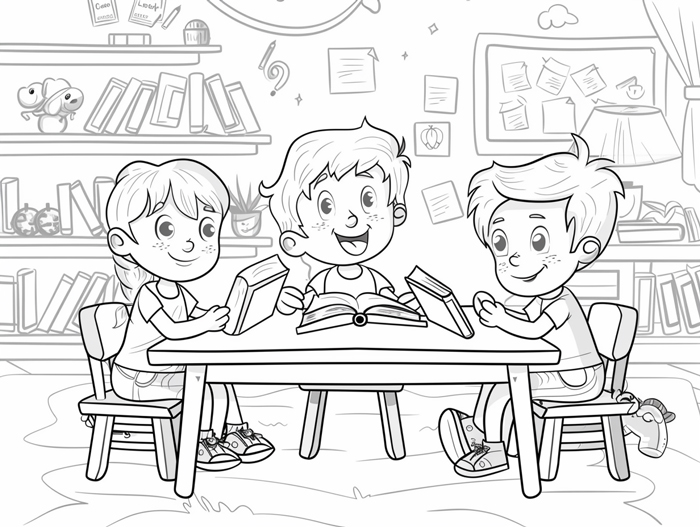
Positive Describing Words for Kids
- Active: Kids who are always on the move and full of energy.
- Curious: Children who are eager to learn and explore the world around them.
- Attentive: Little ones who are focused and pay close attention to details.
- Creative: Kids who express themselves through unique ideas and artistic pursuits.
Describing Words for Kids During Playtime
- Playful: Children who enjoy having fun and engaging in imaginative play.
- Adventurous: Little explorers who love new experiences and taking risks.
- Inquisitive: Kids who ask lots of questions and have a natural curiosity about things.
- Cooperative: Children who are team players and enjoy collaborating with their peers.
- Friendly: Kids who are approachable, kind, and eager to make new friends.
- Kind: Children who show compassion, empathy, and genuine care for others.
- Confident: Little ones who believe in themselves and their abilities.
- Helpful: Kids who willingly lend a hand and assist others in need.
Remember, these are just a few examples of describing words for kids. The key is to use a combination of positive adjectives that accurately capture the unique traits and behaviors of each child. By employing these descriptive words in both educational and playful settings, we can help children develop their vocabulary while promoting a positive and inclusive classroom environment.
Read: 10 Adjectives for Fingers: Descriptions & Examples
Describing Words for Kids in Different Scenarios
- Eager: Children who are enthusiastic about learning and participating in class.
- Focused: Kids who are dedicated and concentrate well on their tasks.
- Responsible: Little ones who consistently complete their assignments and take ownership of their learning.
Adjectives for Kids
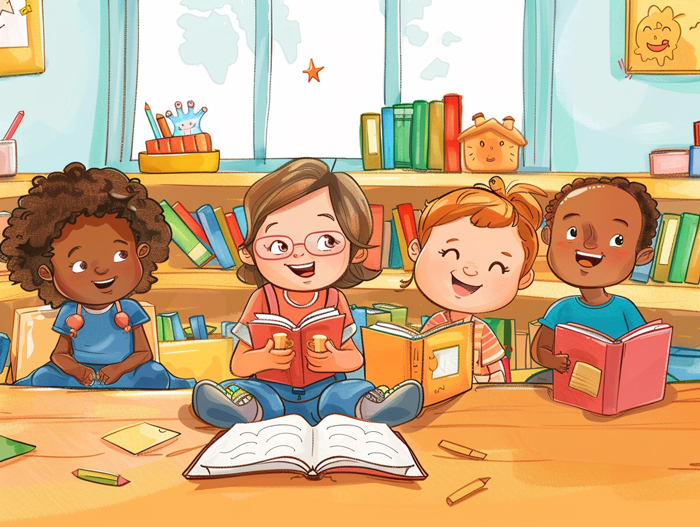
Positive Adjectives for Kids with 10 Example Sentences
When it comes to describing children, there are countless positive adjectives that can accurately capture their unique qualities and behaviors. Using these positive adjectives not only helps children develop their language skills, but also promotes a positive and inclusive classroom environment. Here are ten examples of positive adjectives for kids:
- Active: My students are always on the move, exploring and discovering new things.
- Curious: I love how curious children are, always asking questions and seeking answers.
- Attentive: It’s impressive how my students can be so focused and attentive during lessons.
- Creative: Kids have such imaginative minds, constantly coming up with new ideas and creations.
- Adventurous: I encourage my students to be adventurous, trying new things and taking risks.
- Inquisitive: Their inquisitive nature pushes them to learn more and explore the world around them.
- Cooperative: Children are naturally cooperative, always willing to collaborate and help each other.
- Friendly: The friendly atmosphere in my classroom makes it a welcoming place for all students.
- Kind: I’m proud of how kind my students are, showing empathy and compassion towards others.
- Confident: Watching my students grow and become more confident in their abilities is truly rewarding.
Negative Adjectives for Kids with 5 Example Sentences
While it’s important to focus on the positive attributes, it is also necessary to acknowledge that children can display negative behaviors at times. By addressing these negative aspects, we can help children improve and develop better coping mechanisms. Here are five examples of negative adjectives for kids:
- Impatient: Some children can be impatient when things don’t go their way, which can affect their ability to wait their turn.
- Stubborn: Occasionally, children exhibit stubborn behavior, which can make it challenging to introduce new ideas or activities.
- Disruptive: When children act disruptively, it can disrupt the learning environment for the entire class.
- Shy: Shyness can prevent children from actively participating or engaging with their peers and educators.
- Forgetful: Kids can be forgetful at times, which may lead to missed assignments or misplaced belongings.
Read: Describing Words for Smoke – Examples and Synonyms
Remember, it’s crucial to approach these negative behaviors with understanding and guidance, helping children develop the necessary skills to overcome challenges and grow.
Now that we have explored both positive and negative adjectives for kids, we can have a more comprehensive understanding of how language can accurately describe children in the classroom. By using a combination of positive adjectives, we can create a positive and inclusive environment where every child can thrive.
Synonyms and Antonyms With Example Sentences
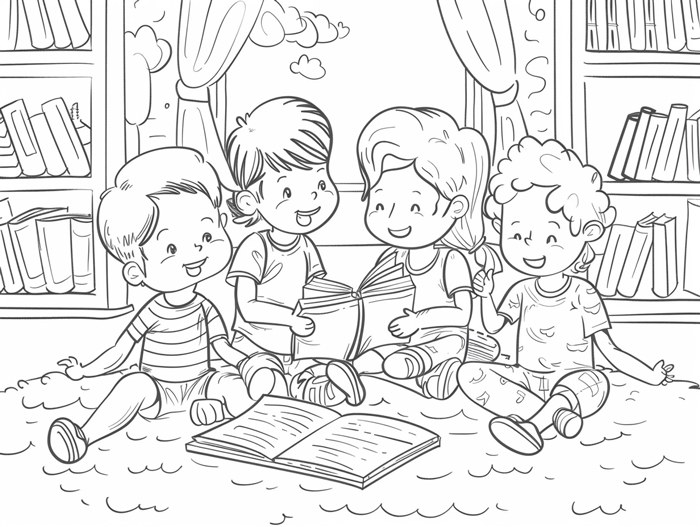
Synonyms for Kids
When describing children, it’s important to use a variety of adjectives to capture their unique traits and personalities. Here are some synonyms for positive adjectives that can be used to describe kids in the classroom:
| Synonym | Definition | Example Sentence |
|---|---|---|
| Active | Energetic and lively | Tom is an active child who loves to play outside. |
| Curious | Inquisitive and eager | Emily is a curious student who always asks questions. |
| Attentive | Focused and alert | Jack is an attentive listener during class discussions. |
| Creative | Imaginative and innovative | Sophia is a creative artist who loves to paint. |
| Friendly | Kind and sociable | Oliver is a friendly classmate who gets along well with others. |
Using synonyms adds variety and depth to your descriptions, making them more engaging to read.
Antonyms for Kids
In addition to using positive adjectives, it’s also important to acknowledge that children may display negative behaviors from time to time. Here are some antonyms, or opposite words, that can be used to describe challenging behaviors:
| Antonym | Definition | Example Sentence |
|---|---|---|
| Impatient | Lacking patience | Emma can be impatient when waiting for her turn to speak. |
| Stubborn | Unwilling to change | James can be stubborn and resistant to trying new activities. |
| Disruptive | Causing disturbance | Lily sometimes becomes disruptive and distracts her classmates. |
| Shy | Timid or reserved | William is shy and finds it difficult to speak in front of others. |
| Forgetful | Tending to forget | Sophie can be forgetful and often misplaces her belongings. |
Antonyms help us address negative behaviors with understanding and provide guidance for children to develop positive habits.
Using a combination of synonyms and antonyms can create a rich and inclusive classroom environment where every child feels seen, understood, and supported. By using various adjectives, we can accurately capture the diverse range of qualities that make each child unique.
Using a wide range of adjectives is essential when describing children in the classroom. By incorporating synonyms for positive attributes like active, curious, attentive, creative, and friendly, we can paint a more vivid picture of each child’s unique qualities. Additionally, identifying antonyms for negative behaviors such as impatient, stubborn, disruptive, shy, and forgetful helps us address challenges and support children in overcoming them.
By utilizing a combination of synonyms and antonyms, we create an inclusive classroom environment where every child feels acknowledged, understood, and encouraged. This approach allows us to celebrate and nurture the individuality of each student, fostering a positive learning atmosphere.
Remember, the words we choose to describe children have a powerful impact on their self-esteem and overall development. By using a diverse range of adjectives, we can help children recognize their strengths, overcome their weaknesses, and thrive academically and emotionally.
So, let’s continue to explore and utilize a rich variety of adjectives when describing children, ensuring that we create a supportive and empowering learning environment for all.
Final verdict
Overall, adjectives are a great way to help kids expand their vocabulary and improve their writing. By teaching them how to use adjectives, they can add detail and interest to their writing, and make it more engaging for readers. It’s also a good way to help them learn to describe people and things more clearly.
